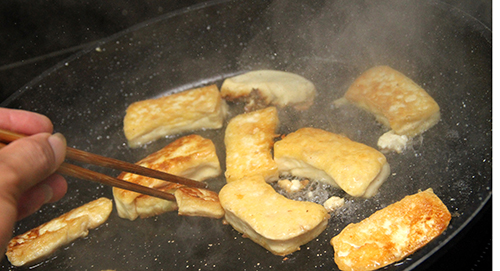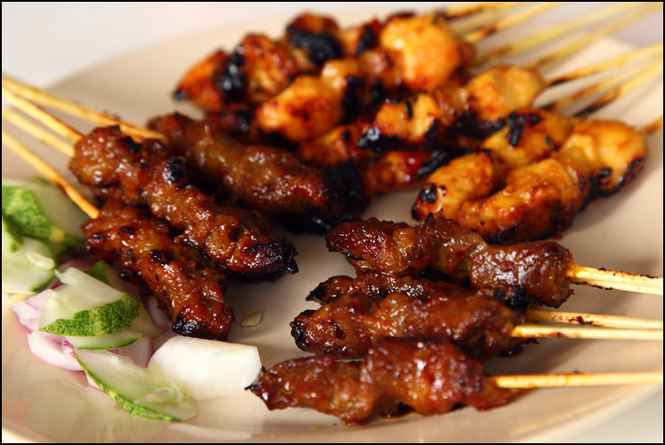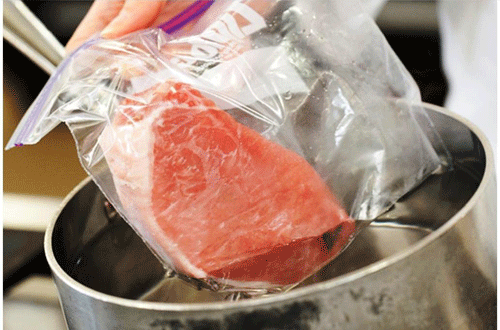Cooking mistakes that can cause cancer
Cooking a delicious meal for the whole family is not easy, ensuring a clean and safe meal is even more difficult. Not only careful in choosing ingredients, but women also have to pay close attention during the cooking process, avoiding the following mistakes that can increase the risk of cancer.
 |
1. Heat cooking oil until it is smoking when frying or sautéing.
Whether intentional or not, this is definitely a bad habit.
When cooking oil is heated beyond its boiling point, it begins to smoke and develop a burnt smell. The burnt smell is caused by oxidation products of fats in cooking oil (lipid peroxides) and related toxicological substances such as aldehydes and lipid peroxides. Aldehydes are toxic substances that cause cancer, cardiovascular disease or dementia, birth defects, inflammation, risk of ulcers and high blood pressure when eaten or inhaled even in small amounts.
Professor Grootveld, of De Montfort University in Leicester, measured the concentrations of toxic compounds produced when cooking oil was heated to different temperatures;
Corn oil and sunflower oil produce three times more aldehydes when heated than butter. Fish and chips fried in vegetable oil contain 100 to 200 times more toxic aldehydes than the WHO's safe daily limit.
Cold-pressed olive and rapeseed oils, as well as butter and goose fat, produce less aldehydes. Coconut oil produces the lowest levels of aldehydes. In other words, they are less dangerous to health. However, fats that are highly stable in heat, such as butter, should be used in moderation because they can increase bad cholesterol and the risk of narrowing of the coronary arteries and heart disease.
2. Use processed oil for further cooking
Re-frying cooking oil reduces the value of the oil, destroying the vitamins in the oil. At the same time, the residue of burnt food during the frying process that remains in the used oil, invisible to the naked eye, is also a harmful agent to the health of the user. Therefore, it is best to use a moderate amount of cooking oil for each cooking, and after frying, throw it away and do not reuse it. Do not just regret a little cooking oil and bring disease into your body.
3. Burn meat, vegetables, bread
Many people love to eat burnt food: burnt grilled meat, burnt toast, burnt grilled vegetables without knowing that the ingredients in these foods can produce cancer-causing toxins at high temperatures.
 |
- Burnt meat: Burnt meat releases a lot of HCAs that cause cancer when accumulated in high concentrations. A study in the US showed that people who eat a lot of meat cooked at very high temperatures have a 60% higher risk of pancreatic cancer than others.
- Grilled vegetables that are grilled for too long not only do not taste good, but the high temperature also destroys most of the vitamins in them and increases the risk of accumulating carcinogens in the burns and smoke.
- Bread is easily burnt when toasted and contains a lot of carbohydrates. Burnt bread contains a notable toxin called acrylamide - a harmful substance often found in starchy foods such as potatoes, bread, etc. When they are toasted for too long, the acrylamide content increases very quickly. Acrylamide can affect reproductive organs. In addition, a small amount of harmful HCAs is also found in burnt bread.
4. Do not turn on the hood while cooking.
During the process of cooking food, harmful substances are produced, especially in cooking oil fumes. At this time, using a range hood to remove exhaust fumes is a good thing to do, especially in a small townhouse.
Even after cooking, you should leave the hood on for 3-5 minutes before turning it off to ensure that all the exhaust fumes are sucked out. Because the amount of exhaust fumes lingering in the house can also contribute to cancer in family members.
In addition, when cooking, you should open the windows to reduce the amount of exhaust fumes remaining in the kitchen.
5. Improper storage and defrosting of meat
Busy life so many housewives have the habit of storing meat in the freezer to avoid going to the market too many times a week. The habit of storing meat in the freezer for a long time not only makes the meat lose its natural deliciousness but also causes deterioration, which is very harmful to the body. The maximum time to store meat in the freezer should be 1 week.
 |
When left in the freezer, meat must be thawed before cooking. However, many people thaw it incorrectly, such as putting it in hot water or a microwave or thawing it at room temperature. These methods are all wrong.
If defrosted at high temperature, it will affect the heat diffusion in the meat, creating an opportunity for germs and bacteria to grow.
If you defrost at room temperature, bacteria will easily penetrate and spoil the meat, making it susceptible to illness. The best way to defrost is to move the meat from the freezer to the refrigerator and wait until it is thawed before cooking.
6. Reheating leftover food
Reheating food can cause nitrates in food to convert into nitrites. Nitrites can oxidize iron in red blood cells to form methaemoglobin, reducing the blood's ability to carry oxygen, depriving vital organs of oxygen. Severe nitrite poisoning can lead to headaches, cyanosis, dizziness, fatigue, heart failure, and possibly death.
The second risk when consuming foods containing nitrates and nitrites is the nitrosation process of nitrites with amines and amides, forming N-nitroso compounds such as nitrosamines and nitrosamides under the influence of fermenting bacteria, which are substances that can cause cancer.
Therefore, housewives need to save time by cooking a lot of food to keep in the refrigerator and then eat in many meals. It is best to only cook enough to eat in one meal, braised dishes can be left for the second meal, but should also be limited.
According to TPO
| RELATED NEWS |
|---|


.png)
.jpg)


.jpg)
